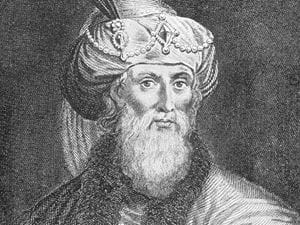
Public Domain
Titus Flavius Josephus was born Yosef ben Matityahu, or Joseph Ben Matthia, in the late A.D. 30’s. He was of aristocratic, priestly origin and, after spending a brief time in an ascetic Jewish sect, became a Pharisee. Like many Pharisees, Josephus had little sympathy for the militant Zealots who wanted to oust the Roman government from Jerusalem.
In A.D. 64, Josephus was sent to Rome to act as a negotiator and secure the release of several Jewish priests. During his time in Rome, Josephus earned the favor of Poppaea Sabina, the second wife of Emperor Nero. He also became fascinated by Roman culture and military might.
When Josephus returned to Judaea, the Zealots shook off the control of Rome and set up a revolutionary government. Josephus and many other priests urged the Zealots to compromise with Rome, but the Zealots refused. Josephus did his best to help his people prepare for Roman retribution, but Rome broke the Jewish military quickly. Josephus was captured by Vespasian and predicted that Vespasian would become emperor. Josephus’ prophecy came true, and he was granted his freedom as a result.
When Rome besieged Jerusalem in A.D. 70, Josephus, who had changed his name and attached himself to the Roman cause, attempted to act as a mediator between the Romans and Jews. He was, however, unsuccessful. The Temple was still destroyed. Afterwards, Josephus returned to Rome where he would devote the rest of his life to creating the writings that would enshrine his name in history.
Josephus’ most famous works are “Bellum Judaicum” or “History of the Jewish War,” “Antiquitates Judaicae” or “The Antiquities of the Jews,” “Vita” or “Life” and “Contra Apionem” or “Against Apion.” While “Life” and “Against Apion” are fascinating for religious historians, it is Josephus’ “History of the Jewish War” and “The Antiquities of the Jews” that contain the most value for modern Christian readers.
“History of the Jewish War” records the history of Israel from the mid-second century B.C. to the revolt of A.D. 66. Part of Josephus’ reasoning for writing the work was to convince the Diasporan Jews still living in Mesopotamia not to rise up against the Romans. The Roman legions would win the war and enough Jewish blood had already been shed. To this day, “Jewish War” remains the principle source for information on this Jewish revolt.
The period leading up to the Jewish revolt was fraught with tension. The Jewish people were becoming increasingly nationalistic and hostile to Rome. As such, Rome could ill afford anything that would destabilize a region that was already a powder keg. The Jews could not be given a rallying point, such as the coming of the Messiah.
Josephus’ illustration of the tension between Rome and Jerusalem provides important context for Jesus’ life and ministry. The Bible focuses more on Christ’s teachings and so downplays the very real dangers of the time. “Is it right to pay the imperial tax to Caesar” was a question that could have gotten Jesus killed or been the spark that started a Jewish revolution.
“Antiquities of the Jews” is considered to be Josephus’ greatest work. The massive document is 20 books long and was completed in A.D. 93. The work was written for a Greek or Roman audience and attempted to explain Judaism in a way that the Hellenistic world would understand and respect. As a result, Josephus downplayed the Prophets in favor of stressing the logic and rationality of Jewish laws and customs. While some of a then-elderly Josephus’ fatigue shows through the work, “Antiquities” preserved many sources and much information that would otherwise have been lost.
Most importantly for Christians, “Antiquities” is a non-Christian, historical record that confirms a number of the accounts in the New Testament. The life and death of John the Baptist are covered in surprising detail, but it is Josephus’ references to Christ that garner the most attention.
“Antiquities” contains two references to Jesus Christ, one in Book XX and one in Book XVIII. The latter is blatantly Christian and is believed by scholars to have been inserted into the work later. The reference in Book XX, however, is believed to have been written by Josephus himself. The mention is short, just one line, but it supports the historical existence of Jesus of Nazareth “who was called Christ.”
Josephus was not a Christian, yet he wrote about events that were incredibly important to Christians: the life and death of John the Baptist, the existence of Christ, the growth of early Christianity and the fate of some of the apostles. The descriptions of these events as written by an outsider show Christians a new perspective on familiar stories.
The greatest value of Josephus’ works for Christians, however, is the context his works provide. He provides detailed descriptions of the tension and times during which Christ would have lived and preached. Old stories and strange Biblical phrases take on new meaning when set against the backdrop of a Judaea preparing to take on the Roman Empire. Furthermore, Josephus’ writings about early Christianity give modern Christians an idea of what potential converts would have seen. Allowing modern Christians to appreciate the context in which Christianity was born and began to grow gives Christians greater ability to appreciate the struggles of the early Church. It also helps Christians take a closer look at stories and verse that they have always taken for granted, and develop a new appreciation for exactly how much the first Christians risked to follow Christ.

